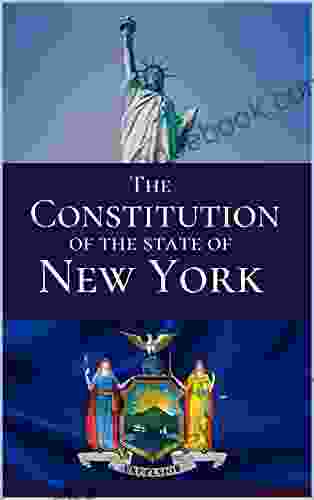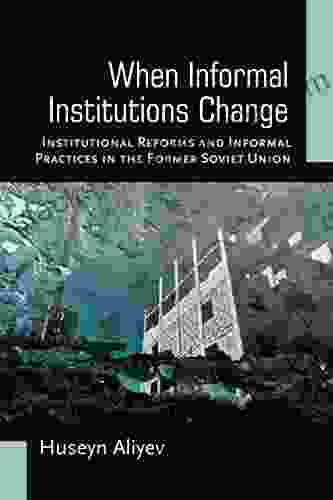Institutional Reforms and Informal Practices in the Former Soviet Union: A Comprehensive Analysis

The collapse of the Soviet Union in 1991 marked the beginning of a tumultuous period of transition for the newly independent states that emerged from its ruins. As these states embarked on a path towards democratic governance and market economies, they faced a daunting task of reforming their institutions and overcoming the legacy of the Soviet past. This article examines the complex interplay between institutional reforms and informal practices in the former Soviet Union, shedding light on the challenges and opportunities that emerged during this transformative period.
4.3 out of 5
| Language | : | English |
| File size | : | 1290 KB |
| Text-to-Speech | : | Enabled |
| Screen Reader | : | Supported |
| Enhanced typesetting | : | Enabled |
| Word Wise | : | Enabled |
| Print length | : | 296 pages |
The Legacy of the Soviet System
The Soviet Union was characterized by a highly centralized and authoritarian system of government. The Communist Party held absolute power, and all aspects of society were controlled by the state. The economy was based on a centrally planned system, and private property was abolished. This environment fostered a culture of informal practices, as individuals sought to navigate the rigidities of the system and secure access to scarce resources.
Institutional Reforms in the Post-Soviet Era
Following the collapse of the Soviet Union, the newly independent states embarked on a series of institutional reforms aimed at establishing democratic governance and market economies. These reforms included the of multi-party elections, the establishment of independent judiciaries, and the privatization of state-owned enterprises. The goal of these reforms was to create a more transparent and accountable system that would foster economic growth and social development.
The Persistence of Informal Practices
Despite the implementation of institutional reforms, informal practices continued to play a significant role in the former Soviet Union. These practices took various forms, including corruption, shadow economies, and clientelism. Corruption, in particular, became a major problem, as individuals sought to exploit the weaknesses of the newly established institutions for personal gain. The shadow economy also flourished, as individuals engaged in unreported economic activities to supplement their incomes or avoid taxes.
The Interplay between Formal and Informal Institutions
The relationship between formal and informal institutions in the former Soviet Union was complex and dynamic. On the one hand, formal institutions provided a framework for governance and economic activity. On the other hand, informal practices often undermined the effectiveness of these institutions, creating loopholes and opportunities for corruption and abuse. This interplay shaped the trajectory of post-Soviet development, as reformers struggled to balance the need for institutional reform with the persistence of informal practices.
Challenges and Opportunities
The persistence of informal practices in the former Soviet Union presented both challenges and opportunities for institutional reforms. Challenges included the erosion of public trust in formal institutions, the difficulty in enforcing laws and regulations, and the potential for informal practices to undermine economic development. Opportunities, on the other hand, included the possibility of leveraging informal networks to facilitate social and economic interactions, the potential for informal practices to provide a safety net for individuals in times of crisis, and the possibility of using informal practices to foster innovation and entrepreneurship.
Institutional reforms and informal practices in the former Soviet Union have been inextricably linked, shaping the trajectory of post-Soviet development. The persistence of informal practices, despite significant institutional reforms, highlights the challenges and complexities of transitioning from a centrally planned system to a democratic and market-based economy. Understanding the interplay between these two spheres is crucial for policymakers and researchers seeking to promote effective governance and sustainable development in the former Soviet Union and other post-communist societies.
4.3 out of 5
| Language | : | English |
| File size | : | 1290 KB |
| Text-to-Speech | : | Enabled |
| Screen Reader | : | Supported |
| Enhanced typesetting | : | Enabled |
| Word Wise | : | Enabled |
| Print length | : | 296 pages |
Do you want to contribute by writing guest posts on this blog?
Please contact us and send us a resume of previous articles that you have written.
 Story
Story Reader
Reader Paperback
Paperback Sentence
Sentence Shelf
Shelf Bibliography
Bibliography Foreword
Foreword Preface
Preface Annotation
Annotation Manuscript
Manuscript Scroll
Scroll Tome
Tome Bestseller
Bestseller Classics
Classics Library card
Library card Autobiography
Autobiography Memoir
Memoir Reference
Reference Encyclopedia
Encyclopedia Dictionary
Dictionary Thesaurus
Thesaurus Character
Character Catalog
Catalog Card Catalog
Card Catalog Stacks
Stacks Periodicals
Periodicals Research
Research Scholarly
Scholarly Lending
Lending Reserve
Reserve Academic
Academic Special Collections
Special Collections Literacy
Literacy Study Group
Study Group Thesis
Thesis Dissertation
Dissertation Storytelling
Storytelling Awards
Awards Reading List
Reading List Textbooks
Textbooks Harvey Yoder
Harvey Yoder Jodi Thomas
Jodi Thomas Daniel W Bushnell
Daniel W Bushnell Caimh Mcdonnell
Caimh Mcdonnell Brad Vanauken
Brad Vanauken Adrian Urban
Adrian Urban Amber Sparks
Amber Sparks Sabella O Abidde
Sabella O Abidde Arnab Biswas
Arnab Biswas Laura Watts
Laura Watts Adriana Trigiani
Adriana Trigiani Jo Wood
Jo Wood Ben Wynne
Ben Wynne Lasean Smith
Lasean Smith Kathryn A T Knox
Kathryn A T Knox Charles Christopher Camosy
Charles Christopher Camosy Mark Ross
Mark Ross C R Hedgcock
C R Hedgcock Margot Livesey
Margot Livesey Julie Lyonn Lieberman
Julie Lyonn Lieberman
Light bulbAdvertise smarter! Our strategic ad space ensures maximum exposure. Reserve your spot today!

 Jesus MitchellThe Secret War Against The Arts: How Censorship, Funding Cuts, and Cultural...
Jesus MitchellThe Secret War Against The Arts: How Censorship, Funding Cuts, and Cultural... Shannon SimmonsFollow ·11.1k
Shannon SimmonsFollow ·11.1k Todd TurnerFollow ·3.1k
Todd TurnerFollow ·3.1k Joshua ReedFollow ·6.8k
Joshua ReedFollow ·6.8k Matt ReedFollow ·6.6k
Matt ReedFollow ·6.6k Jay SimmonsFollow ·6.2k
Jay SimmonsFollow ·6.2k Milton BellFollow ·11.5k
Milton BellFollow ·11.5k Jesus MitchellFollow ·14.6k
Jesus MitchellFollow ·14.6k Edwin BlairFollow ·11.8k
Edwin BlairFollow ·11.8k

 Amir Simmons
Amir SimmonsMore Zeal Than Discretion: A Closer Look at the Risks and...
Enthusiasm is often seen as a positive...

 Wayne Carter
Wayne CarterYear of the Dog: American Poets Continuum 178
Year of the Dog is a...

 David Foster Wallace
David Foster WallaceThe Constitution of the State of New York: A...
The Constitution of the...

 Harvey Bell
Harvey BellSmall Cetaceans of Japan: Exploitation and Biology
Small cetaceans, including...

 Blake Bell
Blake BellEffortless Elegance: A Comprehensive Guide to Captivating...
In the realm of crocheting,...
4.3 out of 5
| Language | : | English |
| File size | : | 1290 KB |
| Text-to-Speech | : | Enabled |
| Screen Reader | : | Supported |
| Enhanced typesetting | : | Enabled |
| Word Wise | : | Enabled |
| Print length | : | 296 pages |












